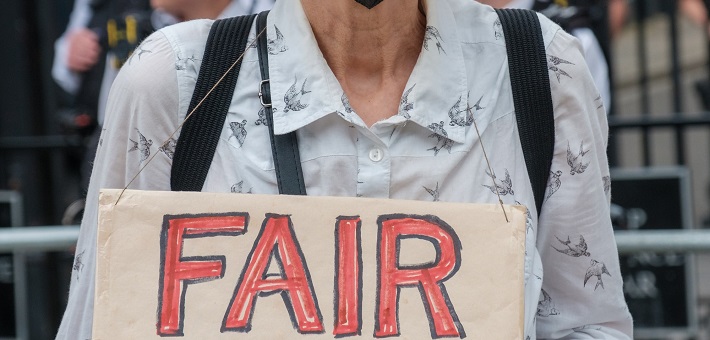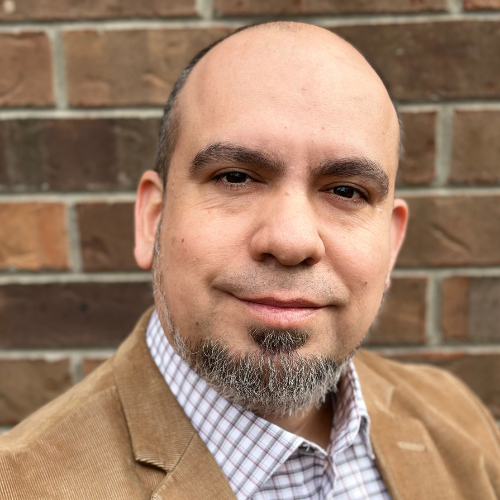Commentary on Luke 18:1-8
As someone who has been an activist and organizer for many years and has sought to ground this work prayerfully as a follower of Jesus, I absolutely love this parable. It speaks to the divinely rooted call to pursue justice, while also grounding it in the context of living a faithful life. It urges us to resist the tendency to think about prayer in a simplified and uni-directional way, as merely words we offer to God in a transactional and hierarchical manner (in other words, the idea of praying to God the “Father” up in the sky). It also makes a clear, intimate, and inseparable connection, in my view, between prayer and justice. This parable invites preachers and all who would receive it to think of prayer as an active, dynamic, relational, and even mystical enterprise between us and God.
A story of contrasts
First, let’s explore this passage as a story of contrasts. The interaction between “the widow and the unjust judge,” as the parable has become known, speaks to us about human striving, tenacity, and faith in the face of disinterested and arbitrary power. We see in Jesus’ depiction of the widow a God-endorsed invitation—an incitation even—to engage in the relentless pursuit of justice, knowing that as Frederick Douglas famously said, “power concedes nothing without a demand.”1
While the gospel of Luke was written in a largely Graeco-Roman context, Luke honored the prophetic traditions of the Jewish faith, and it can be safely assumed that Luke’s audience would have been aware of the teachings in Judaism that placed emphasis on treating the widow (and orphan, stranger, et cetera) with extraordinary compassion and justice.2 Widows were thoroughly marginalized in ancient society, given the patriarchal culture that governed societal norms, and as such, were likely seen as “charity cases.” What Jesus does in this parable is challenge this assumption of the helpless widow, giving her agency and authority to challenge corrupt power.
The perspective offered above is in line with the Hebrew tradition seen in Deuteronomy 16:18, where exhortations are made for judges “to render just decisions for the people.” In addition, an emphatic call is issued: “Justice, and only justice, you shall pursue, so that you may live and occupy the land that the Lord your God is giving you” (Deuteronomy 16:20). This demonstrates that pursuing justice, and especially in relation to the widow and other vulnerable populations, was a necessary part of what it meant to live ethically in relation to God and each other.
All this context sets up this parable for a number of profound and glaring contrasts—the unjust judge being contrary to the call to be just and impartial; the widow exerting authority in her self-advocacy, and the merciful response of God in contrast to the judge. The takeaway is that justice is central to living prayerfully before God.
Not losing heart: prayer as an act of faith
We return to the beginning of this passage, where Jesus tells the disciples this parable “about their need to pray always and not lose heart (Luke 18:1).” As is often the case, looking to the preceding verses in Luke gives a better sense of why Jesus would be sharing a story that centered prayer as an essential spiritual practice to both strengthen their resolve and to remain hopeful on the journey of discipleship. In the last part of Luke 17, verses 20-37, Jesus speaks mysteriously about the Kingdom of God (the basileia tou Theou, see my commentary from October 2 for more discussion about this) being “among (and within) you,” offers a prediction of his suffering and rejection, and a litany of eschatological examples about “the days of the Son of Man.”
After hearing all this, Jesus seemed to know that the disciples needed some reassurance. It is in this larger context of the material-spiritual presence of the basileia in the here and now that Jesus makes the connection between prayer-making, justice-seeking, and God’s mercy. Prayer here is seen as an act of faith in the basileia, a way of actively drawing ever closer to God’s omnipresence and nature. God is everything the unjust judge is not. God grants justice en tachei—suddenly3, or “soon and very soon” as the gospel tune goes.4
Prayer as communion with God
Considering the above, prayer understood relationally lends itself to the tradition of Christian mysticism, which looks to prayer as a way of finding union/communion with God. Theologian Dorothee Soelle says that this experience does not lead “to a new vision of God but a different relationship to the world—one that has borrowed the eyes of God.”5 Borrowing the eyes of God allows us to pray with our eyes wide open as opposed to our eyes closed, being fully present to the many injustices that people face daily, much like the widow in this passage. It allows us to engage in prayers of solidarity that go beyond our own personal petitions, like when Rabbi Abraham Joshua Heschel said, “I felt my legs were praying,” in reflecting on his participation in the historic 1965 civil rights march from Selma to Montgomery.6 Prayer itself can literally embody action.
Transforming prayer today
How do we pray with the eyes of God today? How do we pray with our legs as if our common humanity depended on it (because it does)? Prayer in our current political climate has become increasingly criticized, and for good reason. In the wake of countless mass shootings in the United States, much of the public has become weary with the customary “thoughts and prayers” that get offered by political officials, while very little is done to treat root causes and curb the production and easy access to assault-style weapons. If this is all that prayer is, then it is essentially meaningless, and we have reason to be apathetic and angry about calls for prayer in response to perpetual violence and injustice.7
But today’s gospel shows that prayer can and must be so much more. Like the persistent widow who doesn’t give up, and like our ever-present God who hears the cries of the weary, authentic prayer is faith in action. It is a constant believing and working for a more just and humane world that reflects God’s wellspring of mercy and justice.
Notes
- “Frederick Douglas, “If There is No Struggle, There is No Progress,” (1857) in BlackPast, January 25, 2007, https://www.blackpast.org/african-american-history/1857-frederick-douglass-if-there-no-struggle-there-no-progress/, accessed September 9, 2022.
- Eric Franklin, “Luke,” in The Gospels: The Oxford Bible Commentary, edited by John Muddiman and John Barton (Oxford,UK: Oxford University Press, 2001), 136-137.
- Mikeal Parsons, “Luke 17:11-18:30, Jesus’s Teaching about the Kingdom,” in Luke, Padeia, Commentaries on the New Testament, edited by Mikeal Parsons et al. (Grand Rapids, MI: Baker Academic, 2015), 264-265.
- “Soon and Very Soon (We are goin’ to see the King)” is a gospel hymn written by Andraé Crouch in 1976. See https://hymnary.org/text/soon_and_very_soon_we_are_going, accessed September 9, 2022.
- Dorothee Soelle, The Silent Cry: Mysticism and Resistance (Minneapolis, MN: Fortress Press, 2001), 293-294.
- Kate Collins, “Jewish Voices from the Selma-to-Montgomery March,” in The Devil’s Tale, Duke University Library, January 14, 2015, https://blogs.library.duke.edu/rubenstein/2015/01/14/jewish-voices-selma-montgomery-march/, accessed September 9, 2022.
- Abdullah Shihipar, “The Kind of Prayer That Could Make a Difference,” in The Atlantic, June 1, 2022, https://www.theatlantic.com/family/archive/2022/06/only-thoughts-and-prayers-we-should-offer-uvalde/661156/, accessed September 9, 2022.


October 16, 2022